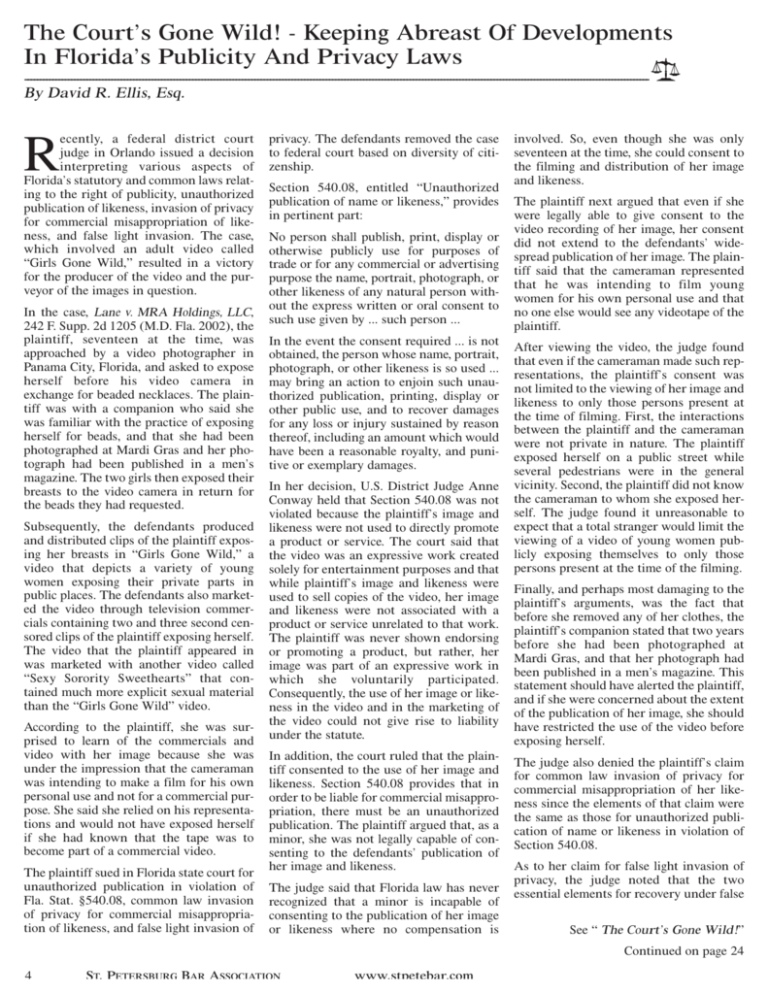
The Court’s Gone Wild! - Keeping Abreast Of Developments
In Florida’s Publicity And Privacy Laws
--------------------------------------------------------------------------------------------------------------------------------------------------------------------------------------------------------By David R. Ellis, Esq.
R
ecently, a federal district court
judge in Orlando issued a decision
interpreting various aspects of
Florida’s statutory and common laws relating to the right of publicity, unauthorized
publication of likeness, invasion of privacy
for commercial misappropriation of likeness, and false light invasion. The case,
which involved an adult video called
“Girls Gone Wild,” resulted in a victory
for the producer of the video and the purveyor of the images in question.
In the case, Lane v. MRA Holdings, LLC,
242 F. Supp. 2d 1205 (M.D. Fla. 2002), the
plaintiff, seventeen at the time, was
approached by a video photographer in
Panama City, Florida, and asked to expose
herself before his video camera in
exchange for beaded necklaces. The plaintiff was with a companion who said she
was familiar with the practice of exposing
herself for beads, and that she had been
photographed at Mardi Gras and her photograph had been published in a men’s
magazine. The two girls then exposed their
breasts to the video camera in return for
the beads they had requested.
Subsequently, the defendants produced
and distributed clips of the plaintiff exposing her breasts in “Girls Gone Wild,” a
video that depicts a variety of young
women exposing their private parts in
public places. The defendants also marketed the video through television commercials containing two and three second censored clips of the plaintiff exposing herself.
The video that the plaintiff appeared in
was marketed with another video called
“Sexy Sorority Sweethearts” that contained much more explicit sexual material
than the “Girls Gone Wild” video.
According to the plaintiff, she was surprised to learn of the commercials and
video with her image because she was
under the impression that the cameraman
was intending to make a film for his own
personal use and not for a commercial purpose. She said she relied on his representations and would not have exposed herself
if she had known that the tape was to
become part of a commercial video.
The plaintiff sued in Florida state court for
unauthorized publication in violation of
Fla. Stat. §540.08, common law invasion
of privacy for commercial misappropriation of likeness, and false light invasion of
privacy. The defendants removed the case
to federal court based on diversity of citizenship.
Section 540.08, entitled “Unauthorized
publication of name or likeness,” provides
in pertinent part:
No person shall publish, print, display or
otherwise publicly use for purposes of
trade or for any commercial or advertising
purpose the name, portrait, photograph, or
other likeness of any natural person without the express written or oral consent to
such use given by ... such person ...
In the event the consent required ... is not
obtained, the person whose name, portrait,
photograph, or other likeness is so used ...
may bring an action to enjoin such unauthorized publication, printing, display or
other public use, and to recover damages
for any loss or injury sustained by reason
thereof, including an amount which would
have been a reasonable royalty, and punitive or exemplary damages.
In her decision, U.S. District Judge Anne
Conway held that Section 540.08 was not
violated because the plaintiff’s image and
likeness were not used to directly promote
a product or service. The court said that
the video was an expressive work created
solely for entertainment purposes and that
while plaintiff’s image and likeness were
used to sell copies of the video, her image
and likeness were not associated with a
product or service unrelated to that work.
The plaintiff was never shown endorsing
or promoting a product, but rather, her
image was part of an expressive work in
which she voluntarily participated.
Consequently, the use of her image or likeness in the video and in the marketing of
the video could not give rise to liability
under the statute.
In addition, the court ruled that the plaintiff consented to the use of her image and
likeness. Section 540.08 provides that in
order to be liable for commercial misappropriation, there must be an unauthorized
publication. The plaintiff argued that, as a
minor, she was not legally capable of consenting to the defendants’ publication of
her image and likeness.
The judge said that Florida law has never
recognized that a minor is incapable of
consenting to the publication of her image
or likeness where no compensation is
involved. So, even though she was only
seventeen at the time, she could consent to
the filming and distribution of her image
and likeness.
The plaintiff next argued that even if she
were legally able to give consent to the
video recording of her image, her consent
did not extend to the defendants’ widespread publication of her image. The plaintiff said that the cameraman represented
that he was intending to film young
women for his own personal use and that
no one else would see any videotape of the
plaintiff.
After viewing the video, the judge found
that even if the cameraman made such representations, the plaintiff’s consent was
not limited to the viewing of her image and
likeness to only those persons present at
the time of filming. First, the interactions
between the plaintiff and the cameraman
were not private in nature. The plaintiff
exposed herself on a public street while
several pedestrians were in the general
vicinity. Second, the plaintiff did not know
the cameraman to whom she exposed herself. The judge found it unreasonable to
expect that a total stranger would limit the
viewing of a video of young women publicly exposing themselves to only those
persons present at the time of the filming.
Finally, and perhaps most damaging to the
plaintiff’s arguments, was the fact that
before she removed any of her clothes, the
plaintiff’s companion stated that two years
before she had been photographed at
Mardi Gras, and that her photograph had
been published in a men’s magazine. This
statement should have alerted the plaintiff,
and if she were concerned about the extent
of the publication of her image, she should
have restricted the use of the video before
exposing herself.
The judge also denied the plaintiff’s claim
for common law invasion of privacy for
commercial misappropriation of her likeness since the elements of that claim were
the same as those for unauthorized publication of name or likeness in violation of
Section 540.08.
As to her claim for false light invasion of
privacy, the judge noted that the two
essential elements for recovery under false
See “ The Court’s Gone Wild!”
Continued on page 24
4
ST. PETERSBURG BAR ASSOCIATION
www.stpetebar.com
BIG
Names...
BIG
Savings...
Save Up To
50
%
Pick up the 2004 Entertainment Book and start
saving up to 50%off your favorite names in
dining, retail and travel!
Get your copy today at the
ST. PETERSBURG BAR ASSOCIATION
2600 M.L. King St. N., STE 602 • St. Petersburg, FL
For more information call (727)823-7474
Now available for only: $20.00
(and for an additional $4.50 your copy can be mailed!)
Broker-Client Securities Litigation
Eric E. Ludin*
We provide representation in
NASD arbitration cases and
state or federal court securities
litigation. If your client has
incurred losses due to stockbroker
malfeasance such as fraud, misrepresentation, inappropriate
investments or unauthorized
trading, we may be able to help.
light invasion of privacy are: (1) the false
light must be highly offensive to a reasonable person; and (2) the defendant must
have acted either knowingly or in reckless
disregard as to the falsity of the publicized
material and the false light in which it
would be placed. Harris v. Dist. Bd. Of
Trustees of Polk Cmty. Coll., 9 F. Supp. 2d
1319, 1329 (M.D. Fla. 1998).
As to the first element, although the use of
the plaintiff’s image and likeness in a
video containing women exposing themselves may be highly offensive, the plaintiff’s inclusion in the “Girls Gone Wild”
video and its marketing campaign with
“Sexy Sorority Sweethearts” did not place
the plaintiff in a false light. Rather, the
plaintiff was depicted truthfully and accurately as doing exactly what she did,
exposing her breasts on a street in Panama
City in exchange for a beaded necklace.
Considering the nature of her actions, the
publication of her image in a video containing other women engaging in similar
acts was neither unreasonable nor inaccurate. Instead, the juxtaposition of the
plaintiff with other women exposing
themselves could not give rise to the tort of
false light invasion of privacy because the
depiction of the plaintiff here was reasonable, accurate, and truthful. Also, there
was no suggestion, implication, or innuendo connecting plaintiff with the more
offensive and sexually explicit scenes of
“Sexy Sorority Sweethearts.” Thus, the
plaintiff’s false light privacy claim, like her
other publicity and privacy claims in the
suit, were denied, and the defendants’ conduct was upheld.
All rights reserved
Sidney Werner*
5720 Central Avenue • St. Petersburg, FL 33707
Phone (727)344-1111
*Member: Public Investors Arbitration Bar Association
Division of fees in accord with Rule 4-1.05 of the Rules Regulating the Florida Bar honored
ST. PETERSBURG BAR ASSOCIATION
Continued from page 4
Copyright ©2003 David R. Ellis
Piper, Ludin, Howie & Werner, P.A.
24
The Court’s
Gone Wild!
www.stpetebar.com
David Ellis is a Largo, Florida attorney
practicing computer and cyberspace law;
copyrights, trademarks, trade secrets,
patents, and intellectual property law;
business, entertainment and arts law; and
franchise, licensing and contract law. A
graduate of M.I.T. and Harvard Law School,
he is a registered patent attorney and the
author of the book, A Computer Law Primer.
He has taught Intellectual Property and
Computer Law as an Adjunct Professor at
the Law Schools of the University of Florida
and Stetson University.
Please direct comments to
ellislaw@alum.mit.edu
http://www.lawyers.com/davidrellis


![[2012] NZEmpC 75 Fuqiang Yu v Xin Li and Symbol Spreading Ltd](http://s3.studylib.net/store/data/008200032_1-14a831fd0b1654b1f76517c466dafbe5-300x300.png)





